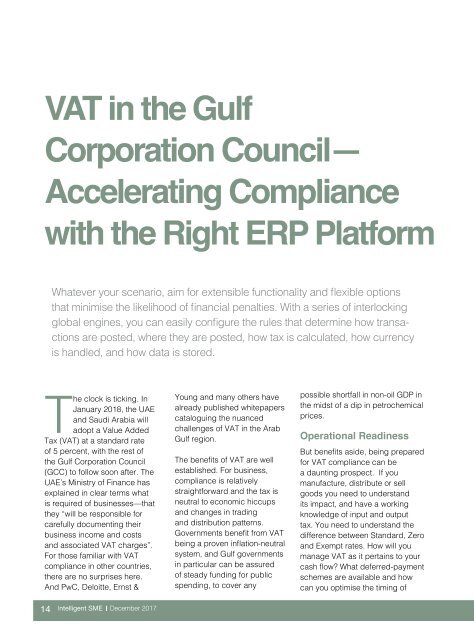ISME Magazine -Issue 39 webview (1)
Create successful ePaper yourself
Turn your PDF publications into a flip-book with our unique Google optimized e-Paper software.
VAT in the Gulf<br />
Corporation Council—<br />
Accelerating Compliance<br />
with the Right ERP Platform<br />
Whatever your scenario, aim for extensible functionality and flexible options<br />
that minimise the likelihood of financial penalties. With a series of interlocking<br />
global engines, you can easily configure the rules that determine how transactions<br />
are posted, where they are posted, how tax is calculated, how currency<br />
is handled, and how data is stored.<br />
The clock is ticking. In<br />
January 2018, the UAE<br />
and Saudi Arabia will<br />
adopt a Value Added<br />
Tax (VAT) at a standard rate<br />
of 5 percent, with the rest of<br />
the Gulf Corporation Council<br />
(GCC) to follow soon after. The<br />
UAE’s Ministry of Finance has<br />
explained in clear terms what<br />
is required of businesses—that<br />
they “will be responsible for<br />
carefully documenting their<br />
business income and costs<br />
and associated VAT charges”.<br />
For those familiar with VAT<br />
compliance in other countries,<br />
there are no surprises here.<br />
And PwC, Deloitte, Ernst &<br />
Young and many others have<br />
already published whitepapers<br />
cataloguing the nuanced<br />
challenges of VAT in the Arab<br />
Gulf region.<br />
The benefits of VAT are well<br />
established. For business,<br />
compliance is relatively<br />
straightforward and the tax is<br />
neutral to economic hiccups<br />
and changes in trading<br />
and distribution patterns.<br />
Governments benefit from VAT<br />
being a proven inflation-neutral<br />
system, and Gulf governments<br />
in particular can be assured<br />
of steady funding for public<br />
spending, to cover any<br />
possible shortfall in non-oil GDP in<br />
the midst of a dip in petrochemical<br />
prices.<br />
Operational Readiness<br />
But benefits aside, being prepared<br />
for VAT compliance can be<br />
a daunting prospect. If you<br />
manufacture, distribute or sell<br />
goods you need to understand<br />
its impact, and have a working<br />
knowledge of input and output<br />
tax. You need to understand the<br />
difference between Standard, Zero<br />
and Exempt rates. How will you<br />
manage VAT as it pertains to your<br />
cash flow? What deferred-payment<br />
schemes are available and how<br />
can you optimise the timing of<br />
recovery of VAT on costs?<br />
If your business crosses<br />
national boundaries, you need<br />
to consider the requirements<br />
of customs authorities—VAT<br />
will add an additional layer to<br />
import-export regulations, and<br />
full compliance will demand<br />
deft handling.<br />
In addition to all of these<br />
considerations, it is expected<br />
that there may be many<br />
exemptions and exceptions<br />
when it comes to intra-GCC<br />
transactions. And there will<br />
remain the significant grey<br />
area of government suppliers,<br />
where a public agency<br />
may have its exempt status<br />
suspended for the purposes<br />
of maintaining a competitive<br />
market.<br />
Different industries will need<br />
to address these complexities<br />
in different ways, in addition<br />
to keeping on top of their own<br />
sector specific issues.<br />
Financial Services<br />
The finance sector traditionally<br />
enjoys many exemptions when<br />
it comes to VAT. In the case of<br />
GCC VAT, it is expected that<br />
these exemptions will extend<br />
to Shariah-compliant banking<br />
and insurance (takaful), but<br />
industry players will have to<br />
wrestle with a certain amount of<br />
complexity to make proper use<br />
of these benefits. Organisations<br />
need to ensure that services are<br />
identified correctly as exempt<br />
or taxable, and that VAT on<br />
reverse-charges is properly<br />
managed. Banks and other<br />
financial institutions may need to<br />
reassess the design of products<br />
to comply, not only with VAT,<br />
but with fundamental changes in<br />
consumer needs.<br />
Manufacturing<br />
Organisations within the<br />
manufacturing supply chain<br />
will feel acutely exposed to<br />
the impact of VAT. Smooth<br />
implementation is crucial, to<br />
ensure sustained cash flow and<br />
optimal operating efficiency.<br />
Manufacturers must keep price<br />
fluctuations firmly in mind, just<br />
as their customers will, and pay<br />
due attention to new invoicing<br />
requirements. Those that are<br />
involved in trade with other<br />
countries inside and outside<br />
the GCC should be prepared to<br />
comply with the strict auditing<br />
requirements of customs officials.<br />
Hospitality and Tourism<br />
Airlines, hotels, travel agents<br />
and other industry specialists<br />
will have very different VAT<br />
stories to tell. The reason for<br />
this complexity lies not only in<br />
the vast operational differences<br />
between, say, an air carrier<br />
and a hotel, but also in the<br />
differentiation between a principal<br />
and an agent. In a recent report<br />
on GCC VAT by Deloitte, the<br />
consultancy firm pointed out<br />
that “many tourism businesses<br />
14 Intelligent SME December 2017 Finance<br />
15


